Results of telephone consultation through "Over-60 Consumer Trouble Dial 110"
There has been an increase in the number of consumer affairs consultations for over-sixties in recent years. Many of the elderly consumers are so-called "active seniors" willing to buy goods and services.
Therefore, the National Consumer Affairs Center of Japan (hereinafter called "NCAC") provided a special telephone consultation service "Over-60 Consumer Trouble Dial 110 in response to increase in troubles among active seniors" (hereinafter called "Over-60 Dial 110") on Thursday-Friday, September 14-15, 2017, with an aim to grasp and analyze recent consumer troubles among over-sixties. The following shows results of the telephone consultation.1
- 1 This telephone consultation service was provided as part of "the joint campaign to protect the elderly from detriment" in cooperation with 16 consumer affairs centers in the Kanto and Koshinetsu region in Japan.
Overview of "Over-60 Dial 110"
- Official name
- Over-60 Consumer Trouble Dial 110 in response to increase in troubles among active seniors
- Date
- Thursday-Friday, September 14-15, 2017 (time: 10:00-16:00)
- Place
- Consultation Department, NCAC (through a special phone line installed)
- Intended inquiries
- those about troubles faced by consumers aged 60 or more (also acceptable from family members or people around the consumer concerned)
Data from aggregate results
(1) Number of consultations
Total : 88 cases (84 complaints, 3 inquiries, and 1 request)
(2) Nature of the contract signatories, etc. (analysis of the 84 complaints) 2
1) Gender of contract signatories
Women comprised 73% of the total.
Diagram 1: Breakdown of contract signatories by gender
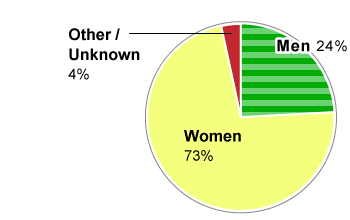
Men comprised 24% of the total. Women comprised 73% of the total. Other or unknown cases comprised 4% of the total.
2) Age of contract signatories
Contract signatories in 60s comprised 24% of the total. Those in 70s comprised 41% of the total.
Diagram 2: Breakdown of contract signatories by age group
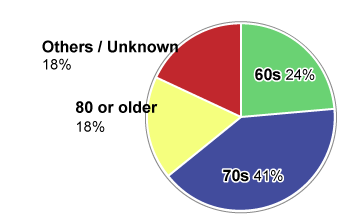
Those in 60s comprised 24% of the total. Those in 70s comprised 41% of the total. Those aged 80 or older comprised 18% of the total. Other or unknown cases comprised 18% of the total.
3) Occupation of contract signatories
The jobless comprised 39% of the total. Homemakers comprised 27% of the total.
Diagram 3: Breakdown of contract signatories by occupation
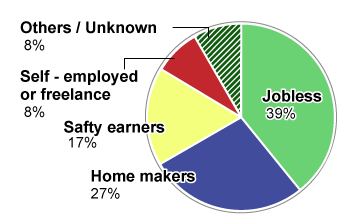
The jobless comprised 39% of the total. Homemakers comprised 27% of the total. Salary earners comprised 17% of the total. The self-employed or freelance comprised 8% of the total. Other or unknown cases comprised 8% of the total.
4) Nature of inquirers
Inquiries from family members, etc. comprised 24% of the total.
Diagram 4: Nature of inquirers
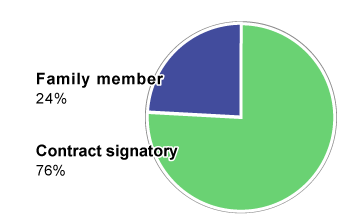
Contract signatories comprised 76% of the total. Family members, etc. comprised 24% of the total.
5) Purchasing methods
Door-to-door purchase by high-pressure buyers comprised 45% of the total. Purchase at shops comprised 20% of the total.
Purchase through door-to-door sales or telemarketing comprised a small proportion this time.
Diagram 5: Purchasing methods
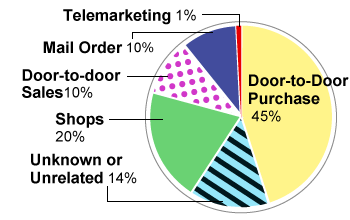
Purchase at shops comprised 20% of the total. Purchase through door-to-door sales comprised 10% of the total. Mail order purchase comprised 10% of the total. Purchase through telemarketing comprised 1% of the total. Door-to-door purchase by high-pressure buyers comprised 45% of the total. Unknown or unrelated cases comprised 14% of the total.
- 2 Percentages may not add to 100 due to rounding.
(3) Common goods and services
NCAC received many inquiries about door-to-door purchase of rings, necklaces, fashion accessories, precious metals, men's or women's clothes, etc. by high-pressure buyers. The consultation was also marked by inquiries related to information/communications (e.g. mobile data communications, mobile phone service, etc.) as well as those related to expensive items such as investment products, forests (secondary damage related to fraudulent selling of wasteland).
Common goods and services inquired about
- Rings
- 12 cases
- Goods in general*1
- 9 cases
- Fashion accessories in general *2
- 4 cases
- Necklaces
- 4 cases
- Mobile data communications
- 4 cases
- Mobile phone service
- 3 cases
- Men's or women's clothes in general *3
- 2 cases
- Coats
- 2 cases
- Precious metals
- 2 cases
- Investment fund product
- 2 cases
- Other financial service
- 2 cases
- Medical service
- 2 cases
- Others (forest, kimono, ordinary life insurance, etc.)
- 36 cases
- *1 "Goods in general" : cases of fictitious billing or cases where the exact category cannot be identified
- *2 "Fashion accessories in general" : cases where the exact category is unknown or plural accessories were traded
- *3 "Men's or women's clothes in general" : cases of clothes where the exact category cannot be identified
(4) Purchase price
The purchase price was less than 100,000 yen in about 67% of the total. The next common price range was from 100,000 yen to less than 500,000 yen. The purchase price was less than 500,000 in about 83% of the total. (Data was accumulated from 52 cases excluding unknown cases. The average amount of contract was about 730,000 yen.)
Diagram 6: Breakdown by purchase price (excluding unknown or non-respondent cases)
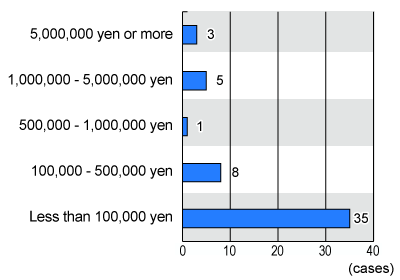
The purchase price was: less than 100,000 yen in 35 cases; 100,000-500,000 yen in 8 cases; 500,000-1,000,000 yen in 1 case; 1,000,000-5,000,000 yen in 5 cases; 5,000,000 yen or more in 3 cases.
Common cases (nature of each contract signatory noted in parentheses)
- [Case1] I asked a business operator to buy disused articles. They bought 500 items of precious metals, etc. at only 100,000 yen without giving any statement. I am dissatisfied.
- I lost my husband and didn't have any social interaction with neighbors. I wanted to get rid of disused articles in my house before I die without bothering my son living far away. Seeing a flyer delivered to my home, I phoned a business operator and asked them to buy my disused articles. Then, a middle aged woman visited my home and told me to show all the disused articles. I brought them from a storeroom to a sitting room and showed more than 500 items, including bags, clothes, postal stamps, jewelry, etc. All of them were unused and boxed. The woman carried the articles one after another into her car, complaining about the task. She didn't give me any statement or receipt. She gave me only 100,000 yen and left. Even now I don't know the price for each item. Although I want the statement at least, I've been at a loss what to do because I'm afraid of their reactions when I request something.
- (woman in her 70s, unemployed)
- [Case2] I received a phone call from a business operator saying "We will buy anything". I accepted their visit and sold my bracelet and wristwatch. I want to inform the fraudulent tactics of the buyers.
- A year ago, I received a phone call from a woman asking if I had any disused articles. I wanted to get rid of brand clothes, so I accepted their visit. Then, a man visited my home and saw my clothes. He said, "These are worthless. Do you have any accessory?", so I handed a broken golden bracelet to him, and he bought it at 1,000 yen. Half a year ago, I received a phone call from another woman asking "Do you have any disused shoes?" and I replied "I don't have any". Then she insisted "We will buy disused articles even if they are worn out", so I put my old clothes in a bag and waited for their visit. A man visited my home and looked at the clothes, but returned them to the bag soon. He asked, "Do you have any accessory or wristwatch?", so I showed an old and broken wristwatch. He bought the wristwatch at 300 yen and didn't buy the clothes. Referring back to the two incidents, I found that such buyers want to get precious metals. I don't know whether or not the two buyers belong to the same company.
- (woman in her 70s, homemaker)
- [Case3] I lent my tablet to my grandchildren. Later I was charged 90,000 yen for data communication, which I cannot afford.
- Seeing a leaflet, I got interest in a tablet and placed an order via telephone. I entered into a contract for data communication which costs a basic monthly charge of 1,000 yen and an extra consumption charge added in multiples of 500 yen. I used to be charged around 2,500 yen at most per month. One day, I lent my tablet to my two elementary school grandchildren. Then, I was suddenly charged 90,000 yen for two months. When I asked my grandchildren how they had used the tablet, they told that they had played online games through the tablet for a long time. I informed the telecommunications carrier that my grandchildren had used my tablet like that, but they didn't accept to reduce the charge. If I have to pay the charge, I want to pay it in installments.
- (man in his 60s, salary earner)
- [Case4] My grandmother was induced to invest in a health food company. She invested, but the company went bankrupt.
- When my mother visited my grandmother's home, she found a huge amount of health foods and certificates for investment. She asked my grandmother the background. My grandmother confessed that she had been induced to invest in a company selling health foods and she had invested 3,100,000 yen in total in three years. According to my grandmother, the company went bankrupt in 2015 and her payment was not refunded. Since then, my grandmother had been depressed and at a loss where to consult. She lives alone and has developed dementia. It's hard for her to consult the matter by herself. I don't know whether or not she has a written contract. I want to ask the company for refund on behalf of her. Is it possible?
- (woman in her 90s, homemaker)
- [Case5] My mother repeatedly sold wasteland and entered into a contract for buying another land.
- My mother owns wasteland which she bought 40 years ago. A year ago, an agent visited her to tell that it was possible to sell the wasteland. My mother asked the agent to sell the wasteland and bought another land at around 2,000,000 yen in cash. She further sold the land to another agent and bought forestland instead, and then she paid 2,300,000 yen in cash. The special clause of the written contract mentioned that it was not possible to use the cooling-off for this contract. According to my mother, the agent is not a real estate broker. I want to cancel the contract and get my money back.
- (woman in her 70s, salary earner)
Advice for consumers
(1) Beware of troubles related to door-to-door purchase of precious metals by high-pressure buyers under the guise of purchasing disused articles.
When a buyer suddenly comes, don't let him/her into your house. If a buyer induces you to sell precious metals which you didn't agree to sell, flatly refuse to do so. Carefully read documents delivered by a business operator. Do not enter into a contract with a business operator which does not deliver due documents. Consumers can refuse to hand over articles to the business operator during the cooling-off period of 8 days. With regard to countermeasures against troubles related to door-to-door purchase, refer to the press release in the past.3
- 3 "Intended to sell disused articles, but happened to sell precious metals! Many old people got in trouble with door-to-door buyers, especially when sorting out belongings."
http://www.kokusen.go.jp/news/data/n-20170907_1.html (released on September 7, 2017)
(2) Inquiries related to information/communications (mobile data communications, mobile phone service, etc.) have been received.
It is predictable that consumer troubles in "active seniors" having much knowledge and experience and using the Internet, smartphones, etc. will continue to grow. In case of internet shopping or mail order, contract details are more complicated and countermeasures against troubles differ from those in face-to-face shopping. Collect appropriate information.
(3) Family members or people nearby may find problems faced by elderly consumers.
The older the contract signatories are, the more problems reported from their family members. If problems faced by elderly consumers remain unnoticed and unattended for some time, consumer detriment may increase. If family members or people nearby pay attention to the elderly on a daily basis, they may notice a change and find problems faced by the elderly consumers. It is also effective to use anti-crime items such as phone recording devices.
(4) If you feel even slightly suspicious or uneasy, consult your local consumer affairs center right away.
If you feel even slightly suspicious or uneasy, consult your local consumer affairs center* right away before making an order, entering into a contract, or making payment.
- * Consumer hotline: 188 (no prefix)
The three digit phone number, which is common nationwide, will connect consumers to a nearby consumer center established by a local government.
(The following web pages are written in Japanese.)
Reference 1
NCAC receives inquiries from consumers via telephone (03-3446-0999) between 11:00 and 13:00 on weekdays, which is called "lunch break consultation for consumers".
Lunch break consultation for consumers
Reference 2
NCAC provides information on its website about unscrupulous sales schemes targeting the elderly, latest trends, and key points to be shared and noted in each community.
Reference 3
Some municipal governments lend phone recording devices to residents free of charge.
